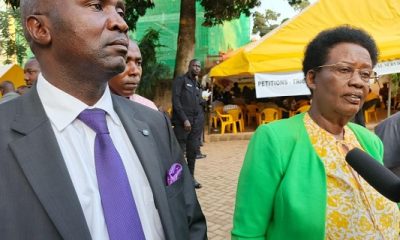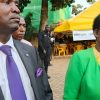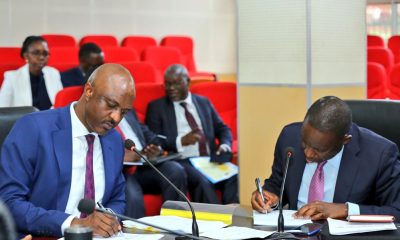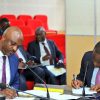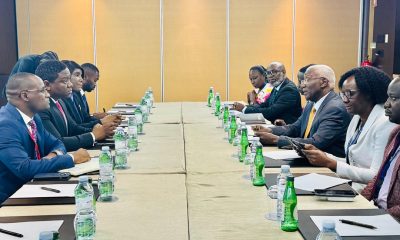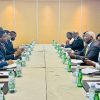Ramathan Ggoobi
Why Kenya is taking off as Uganda writes more visions
In Kenya leaders serve their country; in Uganda they serve a political party!
In his book entitled, “Collapse”, Jared Diamond wrote that countries choose either to fail or to succeed.
He rules out accidents. It all goes down to the choices we make as societies that determine how we live.
When Kenya chose ethnic violence back in 2007, the country went into frames. The leaders quickly realised that the
choice they had made was taking their country to the brink of collapse. They changed course, legislated a new constitution, repackaged their political messages, and organised transparent elections. As they say the rest is history.
Last week, where it was announced that Kenya will become the first country in Eastern Africa to enter the league of middle-income economies. This is not surprising given the level of political and economic maturity Kenya has attained in the recent past.
During the deadly terror attack on the Westgate Mall, a Nairobi shopping centre last weekend, Kenyans showed a level of unity and maturity uncommon in Africa. Social media, especially Twitter and Facebook, were flooded as Kenyans of all political divide came together to condemn the senseless and vicious attack. Thousands of Kenyans came out to donate blood to the injured, to serve tea and snacks to security officers and media, and fundraised over Kshs. 65 million (Ushs 1.9 billion) to help the victims.
All this was not accidental. It was a result of the maturity exhibited by Kenyan politicians. President Uhuru Kenyatta, former Prime Minister Raila Odinga, and former Deputy Prime Minister Musalia Mudavadi, all opponents during the March presidential polls, addressed a joint press conference calling upon Kenyans to stand united in the war against terrorism.
They urged Kenyans not play into the perpetrators’ hands by allowing themselves to be divided on religious, ethnic, or political lines. “As leaders, we are united in ensuring perpetrators of this cowardly act are dealt with accordingly.
Terrorism knows no religious or tribal or political boundaries. Let’s all be united in defeating it,” they said. At such a critical moment, it was Odinga who led the group of political leaders that called on the international community to support Kenya and not issue travel advisories because that would hurt the country’s tourism sector. I did not want to imagine what our opposition politicians here would do if a similar tragedy hit Uganda.
However, before we blame leaders opposition leaders for always appearing to be fighting government even at times when the country requires everyone to join hands, we need to analyse how Kenya got where it is today.
The show of great solidarity, unity, and patriotism by Kenyan politicians was not accidental. It was a result of mature statesmanship exhibited by President Kenyatta himself since he won the office in March. He has continuously sent out a uniting message, calling upon his political opponents to come on board and they work together to build their country. It is this consistent message of unity that has brought on board the hitherto despondent opponents such as Odinga.
Mr. President, it is you politicians that make the choices that make countries either to succeed or to fail. I don’t remember the last time you called upon your opponents such as Dr. Besigye and others to join you to unite Ugandans and develop our country.
Your language is often more dividing than uniting. Actually I cannot remember the last time you talked about Uganda. You enjoy talking about NRM (we in NRM are saying… when NRM discovered oil… NRM has defeated Kony…. etc) instead of Uganda.
Even government programmes are nowadays a preserve of NRM supporters only. It is not uncommon to hear leaders, including you Mr President, talking about a programme such as an anti-poverty programme along partisan lines. “Our NRM supporters shall access NAADs funds to commercialize agriculture…” You once said a State of Nation Address. Imagine such a statement!
Ugandan politicians, you are doing a very big disservice to this country by disuniting our people along political lines, yet it is this very government that had done a great job uniting us by demystifying tribal and religious differences.
In March this year, I penned a piece about the political lessons Uganda ought to learn from her neighbours in Kenya. Like us, and many other countries in Africa, Kenyans have many challenges ranging from ethnic polarisation to having limited capacity to organise free and transparent elections.
The March elections exposed Kenya as having some of the worst tribally divisive politics in the world. Each candidate among the two forerunners, the winner and now President Uhuru Kenyatta and Raila Odinga, got nearly 100% of the votes from their tribal strongholds. For example at Siaya, a town in Nyanza Province located 74 kilometres Northwest of Kisumu (Odinga’s hometown), Odinga polled 99% of the valid votes cast! Likewise, Kenyatta polled over 98% of the votes cast in Kikuyu land (Nyandarua in Central Province, Kericho, Nakuru and Baringo in the Rift Valley Province etc.).
This simply depicts a country still frozen in tribal politics.
But because the politicians in Kenya have matured as depicted by their unity during the terrorist attacks, the people of
Kenya are steadily building their democracy. When Mzee Mwai Kibaki heeded the constitutional obligation and retired after serving his two terms, he opened the door for a new chapter in Kenya. Uganda squandered this very opportunity in 2005 when you, Mr. President, amended the 1995 constitution to open the way for your endless presidency
Mr President, like I have been writing in these very pages again and again, your continued failure to address this critical issue of political predictability in our country has left us worried. The greatest challenge to Uganda’s democracy now is the incumbency factor.
I have written in these pages, on several occasions, that your failure to give Ugandans assurance that their country will for the first time change president without bloodshed was generating uncertainty and frustration. I also warned you that although Ugandans loved you so very much, justifiably because you dedicated a greater part of your life struggling to better their lives, you risked wasting away everything you had achieved due to your failure to show us that you are different from other selfish leaders who have led this country before. Uganda has seen several “liberators” and “freedom fighters” turn into predators and self-liberators.
It is our failure to right some of these political wrongs that is making our neighbours in Kenya and Tanzania fear to integrate with us. My damn feeling is that they are reluctant to cooperate with us in a political federation because of our dirty past, present and thus an uncertain future.
Likewise, our economy has stagnated because of political uncertainty. We are running around writing plans and visions purportedly to transform the economy before you leave power. Alas that is not how economies transform. Economics collapses when politics fails. The reason our economy collapsed in the 1970s and ’80s was not because Obote and other leaders could not write good plans. No. It collapsed because the politics had failed and they failed to fix it.
Likewise, the reason the economy recovered quite impressively in the 1990s and early 2000s was not because Uganda had oil or much electricity. Never! The economic recovery of the past two decades was a result of the good politics and predictability that enabled several economic reforms to take place.
The reason investment expenditure and consumption are dwindling toady is because people are no longer certain about the future. Like I wrote in these pages not a long time ago, people make intertemporal choices, such as households deciding how much to save or to spend, or whether to consume now or in the future. Or business firms having to decide how much to invest now, whether to borrow or sell part of its assets in order to obtain capital to invest and increase its future output and create higher profits, depending on the future expectations.
History has taught Ugandans to form their expectations about the future basing on the extent to which their expectations about the present period turned out to be wrong! Mr President, you leaders and politicians are letting Ugandans down.
Your divisive politics has left the population disunited, polarised and unpatriotic. Kenya offers good lessons on how to unite an ethnically, politically and religiously diverse society. Above all it offers vital lessons on how a country can quickly jump from failure to unprecedented success even in the face of several security threats.
Comments
Ramathan Ggoobi is Policy Analyst, and Researcher. He lecturers economics at Makerere University Business School (MUBS) and has co-authored several studies on Uganda's economy. For the past ten years, he has published a weekly column 'Are You Listening Mr. President' in The Sunrise Newspaper, Uganda's Leading Weekly



